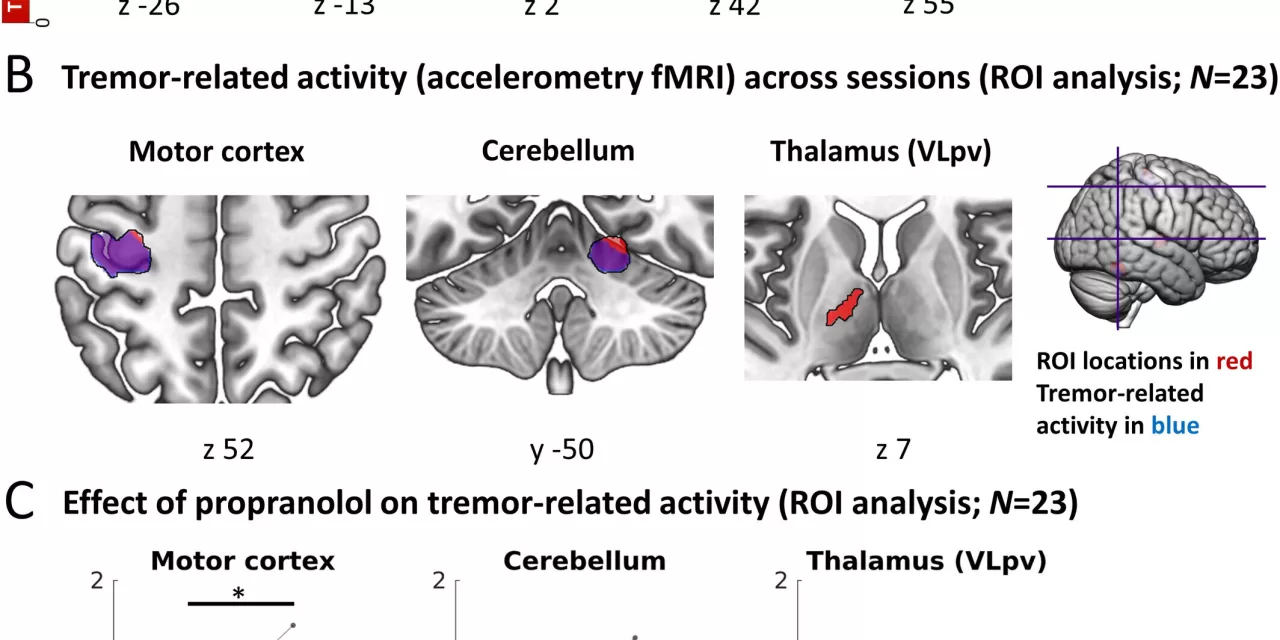December 24, 2024 — A recent clinical trial has revealed promising results for the use of propranolol, a commonly prescribed beta-blocker, in reducing tremors in patients with Parkinson’s disease, particularly during stressful situations. The study, published in the Annals of Neurology, provides new insights into the role of the brain’s stress response in amplifying tremor intensity.
Parkinson’s disease, a neurodegenerative disorder known for its motor symptoms such as tremors, stiffness, and bradykinesia, often presents a challenge in managing tremors, especially in stressful situations. While levodopa, the standard medication for Parkinson’s, is effective for most symptoms, it tends to lose efficacy when stress exacerbates tremors. Neurologist Rick Helmich and his team at Radboud University Medical Center sought to explore whether targeting the stress system could offer an alternative solution for these patients.
“People with Parkinson’s disease often report that their tremors worsen during stressful situations, serving as a barometer for their stress levels,” Helmich explains. “We wanted to understand how stress affects tremors in the brain and whether propranolol could help manage this.”
Propranolol, initially developed to treat high blood pressure and heart arrhythmias, has been found effective in managing essential tremor, a condition similar to Parkinson’s tremors but without other neurological symptoms. Prior research suggested that propranolol might be beneficial for Parkinson’s patients, but this trial is the first to rigorously investigate its effects on stress-induced tremors.
Study Design and Findings
The trial included 27 individuals with Parkinson’s disease who experienced significant tremors. Participants were administered propranolol on one day and a placebo on another. Their tremors were measured with a device placed on their hands, while MRI scans were used to track brain activity during both rest and a stressful task involving complex mathematical calculations. To monitor the stress response, researchers measured pupil size and heart rate, both of which increased during the task.
The results were striking. Propranolol reduced tremors both at rest and under stress. MRI scans revealed that the drug worked by inhibiting the activity of the brain circuit responsible for tremors, particularly the motor cortex, which controls movement. “We believe the stress hormone noradrenaline acts as an amplifier in the brain’s movement area, intensifying tremors,” Helmich said. “Propranolol inhibits this amplifying effect, providing relief for Parkinson’s patients.”
One unexpected finding was that propranolol also reduced tremors at rest, suggesting that the stress response system is not limited to stressful situations but is active even when the body is relaxed. “Our stress system plays a role in tremor fluctuations, even when patients aren’t consciously stressed,” explained Anouk van der Heide, a researcher on the team. “This challenges the previous assumption that the stress system is only active under stress.”
Implications for Treatment
Propranolol is already used as a treatment for some Parkinson’s patients when levodopa fails to adequately control tremors. Helmich notes that levodopa is the most effective medication for Parkinson’s, but it is ineffective for around 40% of patients when it comes to tremor control. For those patients, increasing the dose or turning to propranolol may offer relief. However, the use of propranolol must be carefully monitored for side effects, particularly low blood pressure.
In addition to medication, Helmich’s team is exploring lifestyle interventions to manage Parkinson’s symptoms. “Simple stress triggers, such as wondering if you’ve locked the front door, can cause tremors to worsen,” he explains. “We are investigating whether mindfulness techniques can help regulate the stress system and improve patient outcomes.”
The research offers hope for individuals with Parkinson’s disease, particularly those whose tremors are difficult to manage. With continued study into both medication and non-medication approaches, the future for Parkinson’s patients may see significant improvements in quality of life.
Reference: Anouk van der Heide et al, Propranolol Reduces Parkinson’s Tremor and Inhibits Tremor‐Related Activity in the Motor Cortex: A Placebo‐Controlled Crossover Trial, Annals of Neurology (2024). DOI: 10.1002/ana.27159











